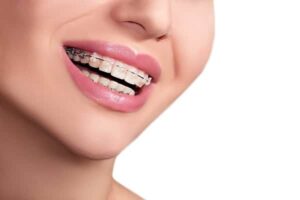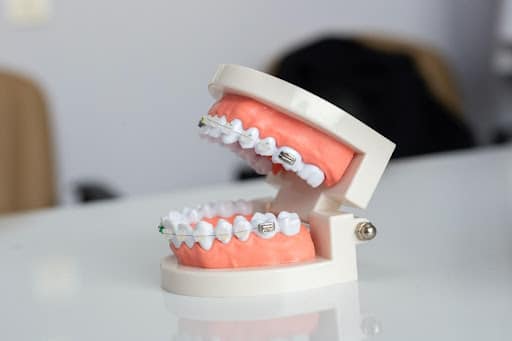There are different orthodontic treatments for Braces to Fix various orthodontic and dental issues. If you have dental problems, seeking orthodontic treatment can help you get a beautiful, healthy smile, boosting your self-esteem and confidence in social situations. The right orthodontic treatment can also reduce your risk of developing severe complications like chewing and biting difficulties, speech impediments, and jaw disorders.
And one of the best and most effective ways to fix your orthodontic problem is using braces. Braces are an excellent choice for both children and adults with teeth problems. There are different types of braces to choose from depending on your kind of dental problem and the severity of your case. So, if you are unaware of what can braces fix and unsure whether wearing braces can help correct your dental problem, here are some of the most common orthodontic issues you can fix using braces.
How Do Braces Work?
Before we look at what problems braces can fix, it’s crucial for you to understand how braces work to straighten your teeth and help you achieve that perfect smile. Braces consist of archwires and brackets that work together to correct various dental problems. The brackets usually hold the braces in position while the archwire exerts pressure constantly on your teeth, gradually encouraging them to move into their rightful positions. Braces need adjusting every 4 to 8 weeks to keep them working as efficiently as possible in moving your teeth and ensure more accurate results within the treatment period.
While Braces work effectively at straightening and aligning the teeth, the treatment usually takes longer for adults, which is one of the main problems with braces for adults. Another major disadvantage of braces is that they can encourage the buildup of food particles and plaque, causing tooth decay. So, it would be best to stay on top of your oral hygiene to prevent food accumulation in the braces and teeth.
Orthodontic Issues Can Braces Fix:
Braces in Middletown are ideal for all ages, including children, teens, and adults. Here are the most common problems that you can correct by wearing braces:
Overcrowding: Many people wonder if braces can fix an overbite, and the answer is yes. An overbite occurs when your upper front teeth overlap with your lower front teeth, causing a misalignment of your bite. Overbites can be caused by genetics or childhood habits like thumb-sucking or tongue-thrusting. If left untreated, an overbite can cause jaw pain, headaches, and difficulty biting and chewing. Braces can correct an overbite by applying pressure to your teeth and gradually moving them into the correct position. Upper teeth braces can be particularly effective in fixing an overbite because they focus on the upper teeth that are causing the overbite. However, the severity of the overbite will determine how long you will need to wear braces. Your orthodontist in Middletown will take reference to these issues and design a personalized treatment plan to fix your overbite and give you a healthy, functional, and beautiful smile.
Teeth Spacing: Also known as diastema, spacing happens when there are uneven gaps or larger than usual spaces between the teeth. While gapped teeth are pretty common, sometimes they might make your smile unattractive, making you feel more self-conscious. Food particles can also get trapped between your teeth, leading to tooth decay and even gum disease. Gapped teeth often cause an improper bite, which can result in broken or chipped teeth. Braces can help fix your teeth’ spacing problem by closing the gaps between the teeth.
Misaligned Jaw: A misaligned jaw occurs when your lower and upper teeth don’t touch while closing your mouth. The leading causes of a misaligned jaw include overcrowding and crooked teeth. Over time, your misaligned jaw can lead to faster tooth wear or even other complications, such as the temporal mandibular joint (TMJ), which can cause discomfort and pain in your jaw. But can braces fix an asymmetrical jaw? Wearing braces is one of the proven ways to straighten and align your teeth, which push your jaw into the correct position and help your teeth meet comfortably.
Underbites: Unlike an overbite, an underbite is when your lower teeth stick out over your upper teeth. An underbite can cause you to age faster and make your face appear unbalanced. It also can make chewing and biting difficult for you.
Whether braces can correct an underbite is a common question today, and the answer is positive. Braces can effectively treat underbites by exerting pressure on your teeth, causing them to shift into the appropriate position over time. This gradual process can effectively fix your underbite and give you a healthier and more balanced smile.
Open Bites: Open bites are usually characterized by a large space between your front upper and lower teeth. Common causes of open bites are excessive use of a pacifier and thumb-sucking. They can cause speech problems, biting difficulties, and lisps. Braces can successfully treat your open bite problem by correctly aligning your lower and upper teeth.
Overbites: Commonly referred to as bucket teeth, an overbite happens when your upper teeth protrude outward above your lower teeth. An overbite can make your chin appear smaller than usual and can cause chewing and biting difficulties. Braces can help fix your overbite issue by shifting your upper teeth back to align with your lower teeth. You may need to use rubber bands together with the braces to ensure faster and more accurate overbite correction.
Cross Bite: A crossbite happens when some of your upper teeth sit behind your lower teeth. When it involves your back teeth, it’s known as a posterior crossbite, and if it’s your front teeth, it’s referred to as an anterior crossbite. It can be caused by your genetics or even prolonged thumb-sucking. Both anterior and posterior crossbites can be successfully corrected using braces.
Unmatched Dental Midlines: A misaligned midline occurs when there is a mismatch between the center of your upper front teeth and that of your lower front teeth. This can affect how your jaws lay down against each other, making biting or chewing uncomfortable. It can also distort your facial appearance. Braces are an effective way of correcting midline misalignments, no matter the cause.
Chewing and Speech difficulties: When your teeth are misaligned, you may experience problems chewing or even speaking properly. Braces help align your teeth and jaw properly, allowing your upper and lower teeth to come into contact. This helps correct your speech problem and improve your bite.
Low Self-Esteem and Confidence Caused by Misaligned Teeth: Orthodontic problems like misaligned teeth, overcrowded teeth, and crooked teeth can make your smile unattractive. This can lower your self-esteem and make you avoid laughing or smiling, especially in social situations. By correcting your dental problems, braces help boost your self-confidence and improve your self-worth. This way, you can smile confidently without worrying about what other people think about how your teeth look.
Periodontal Problems:
Maintaining proper oral hygiene helps reduce your risk of developing different periodontal issues and improves your overall well-being. However, if you have severely misaligned teeth, it becomes extremely difficult or nearly impossible to brush and floss your teeth properly. This leads to a buildup of food particles and plaque between your teeth, resulting in gum disease and gingivitis. Braces help straighten and properly align your teeth, which makes brushing and flossing easy for you. This allows you to observe good oral hygiene and reduce your chances of periodontal problems.
Conclusion:

If you or your child is suffering from any of the above-listed problems, you may consider correcting the issue using braces. An experienced orthodontist can help develop a unique treatment plan for you to ensure correct teeth movement, which will help you get the smile of your dream in the fastest time possible.
If you’re interested in orthodontic treatment with braces, Dr. Michael Skrobola, Dr. Jonathan Schlosser, and the team at Bracesetters Orthodontics are here to provide complete information to their patients considering treatment with braces in Middletown. You may create a healthy, attractive smile that will last a lifetime with the proper orthodontic treatment. Please contact us if you have any questions about brace treatment or the outcomes.
